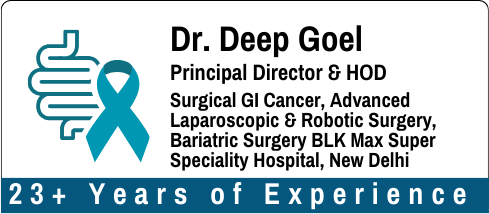What Can Patients Expect Before, During, and After Rectal Cancer Surgery?

Rectal cancer remains a significant global health challenge, affecting countless lives each year. According to the World Health Organization, colorectal cancer, which includes rectal cancer, is the third most commonly diagnosed cancer worldwide, with over 1.9 million new cases reported in 2023 alone.
In India, approximately 1 in 10 people diagnosed with cancer face rectal cancer, highlighting the pressing need for awareness and early detection. As patients navigate the complex journey of diagnosis and treatment, understanding what to expect before, during, and after rectal cancer surgery can empower them and alleviate concerns.
In this blog, we will delve into the crucial aspects of this surgical journey, guided by insights from Dr. Deep Goel, a leading expert in the field, and inspiring testimonials from patients who have experienced this transformative process firsthand.
What Are the Common Rectal Cancer Symptoms?
Before discussing surgery, it’s essential to recognise the signs that may indicate rectal cancer. Common rectal cancer symptoms include:
- Changes in bowel habits: This may include diarrhoea or constipation lasting longer than a few days.
- Blood in stool: Bright red or very dark blood in the stool can be alarming.
- Unexplained weight loss: Losing weight without trying may signal underlying health issues.
- Abdominal discomfort: Persistent pain or cramping in the abdomen.
- Fatigue: Chronic tiredness that doesn’t improve with rest.
If you experience any of these symptoms, consulting a healthcare professional is crucial. Early detection can significantly improve treatment outcomes.
What Are the Rectal Cancer Causes?
Understanding the rectal cancer causes can also help patients navigate their journey more effectively. While the exact cause of rectal cancer remains unclear, several factors can increase the risk, including:
- Genetics: A family history of colorectal cancer can heighten risk.
- Lifestyle: Poor diet, lack of exercise, obesity, smoking, and heavy alcohol use can all contribute.
- Age: The risk of developing rectal cancer increases with age, particularly after 50.
- Chronic conditions: Conditions such as inflammatory bowel disease (IBD) or certain genetic syndromes can elevate risk.
Dr. Deep Goel emphasises, “Understanding the causes of rectal cancer is crucial in empowering patients to make lifestyle changes that can significantly reduce their risk.”
What Are the Different Rectal Cancer Surgery Types?
Several rectal cancer surgery types exist, and the specific approach depends on the stage and location of the cancer:
- Local excision is often used for early-stage cancer. The tumour and a small margin of healthy tissue are removed.
- Resection: In more advanced cases, a section of the rectum, along with surrounding tissues and possibly lymph nodes, is removed.
- Abdominoperineal resection (APR): This procedure is performed when the cancer is located very low in the rectum, requiring removal of the rectum and anus, resulting in a colostomy.
- Laparoscopic surgery: Minimally invasive surgery that uses small incisions and specialised instruments.
Each type of surgery has its pros and cons, and Dr. Deep Goel states, “Choosing the right surgical option is pivotal for successful outcomes and recovery.”
What Can Patients Expect Before Surgery?
Before surgery, patients will undergo several evaluations, including imaging tests and consultations with their healthcare team. Preparation might involve:
- Dietary changes: To ensure bowel clarity, patients may be asked to follow a low-fibre diet or undergo bowel preparation.
- Pre-operative assessments: Blood tests and possibly a colonoscopy will be done to evaluate overall health and the extent of cancer.
- Discussing anaesthesia: Understanding the type of anaesthesia used can help ease anxiety.
- Addressing concerns: Patients are encouraged to discuss any worries or questions with their medical team.
One patient, Aditi Sharma, shared her experience: “Before my surgery, I had so many questions, but Dr. Goel took the time to address each one. His reassurances made me feel more prepared and less anxious.”
What Happens During Rectal Cancer Surgery?
During the surgery, patients are typically placed under general anaesthesia. The duration of the surgery varies based on the complexity of the procedure, ranging from 1.5 to 4 hours.
Once the surgery begins, the surgical team will:
- Remove the cancerous tissue: Following the appropriate surgical method discussed earlier.
- Ensure surrounding tissues are healthy: This step is crucial for preventing recurrence.
- Reconstruct the bowel: If necessary, to maintain function.
Dr. Deep Goel notes, “During surgery, our primary goal is to remove cancer while preserving as much function as possible.”
What Can Patients Expect After Surgery?
Post-operative recovery is critical for successful healing. Here’s what to expect:
- Hospital stay: Most patients stay in the hospital for 3 to 7 days, depending on the type of surgery.
- Pain management: Medications will be provided to manage discomfort.
- Dietary adjustments: Patients may start on a liquid diet and gradually transition back to solid foods.
- Follow-up appointments: Regular check-ups are essential for monitoring recovery and detecting any potential recurrence.
- Support groups: Connecting with others can provide emotional support and share experiences.
A former patient, Rajeev Patel, shared, “My recovery journey was challenging, but with Dr. Goel’s support and guidance, I felt empowered every step of the way.”
How Much Does Rectal Cancer Surgery Cost?
The cost of rectal cancer surgery in India varies based on the procedure type, hospital, and location. Generally, the cost ranges from INR 1,50,000 to INR 5,00,000 (approximately 1,800 to 6,000 USD). Simple surgeries, such as local excisions, may cost around ₹1,50,000 (1,800 USD), while more complex surgeries, like abdominoperineal resection, can reach ₹5,00,000 (6,000 USD). Tier 1 cities like Delhi and Mumbai tend to have higher costs than Tier 2 and Tier 3 cities. Additional expenses for pre-operative tests and post-operative care may also apply, making insurance coverage advisable to help manage costs.
Conclusion
Navigating the journey through rectal cancer surgery can be daunting, but with the correct information and support, patients can feel empowered and prepared. From understanding the symptoms to preparing for surgery and what to expect afterwards, knowledge is a powerful ally in this journey.
As Dr. Deep Goel states, “Being informed and proactive about your health can make a significant difference in your treatment journey. You are not alone; we are here to support you every step of the way.”
If you or a loved one is facing rectal cancer, remember that hope and healing are possible. With the proper care and guidance, a successful recovery is within reach.
FAQs
What is the recovery time after rectal cancer surgery?
Recovery typically takes 4 to 8 weeks, depending on the procedure’s complexity and individual health.
Will I need chemotherapy after surgery?
Some patients may require chemotherapy, depending on cancer staging and pathology results.
What are the potential side effects of rectal cancer surgery?
Possible side effects include changes in bowel habits, pain, fatigue, and emotional challenges.
Can I return to normal activities after surgery?
Most patients can gradually resume normal activities within a few weeks, but heavy lifting should be avoided for several weeks.
How often should I have follow-up appointments?
Regular follow-up appointments are essential and are typically scheduled every 3 to 6 months for the first few years.
Explore more blogs: Rectal Cancer Surgery: Your Treatment Options and What to Expect

